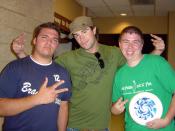To Another Housewife
In Judith Wright's poem, "To Another Housewife", change occurs as the fundamental motif. The composer has harnessed a variety of language techniques to promote these changes. "To Another Housewife" is a dramatic monologue that talks about the changes in the values and responsibilities of a girl as she matures into adulthood. Judith Wright has written this to highlight the fact that many people are in this situation.
Wright uses contrast and juxtaposition to outline this change in values when the girl who had at one time despised seeing death ("with tomahawk and knife we hacked/ at flyblown tatters of old meat") has come to associate with it daily ("these hands with love and blood imbrued"). Both cases symbolise violence and death. The contrast apparent is that the persona now kills with love for her family as her responsibilities have shifted; forcing her to sacrifice the values she forced herself to grow up with.
Irony becomes a conspicuous component in "To Another Housewife". Wright applies contrasting imagery to intensify the irony portrayed within the poem. In the past the persona made a pact to never touch meat again after feeding hunting dogs "lean and loud/ half starved and furious, how they leapt/ against their chains, as though they meant/ in mindless rage for being fed/ to tear our childish hands instead". She later breaks this pact in order to feed her family. Wright uses the word "greensick" in the second stanza - defined as an iron-deficiency anaemia, which is highly appropriate, because red meat contains plenty of iron.
As a child, the persona was "on duty bound", to feed "hungry dogs". Irony plays its role, when she mentions feeding "hungry men" when she becomes a housewife. The phrase "some things don't change" is notably appropriate in this...


